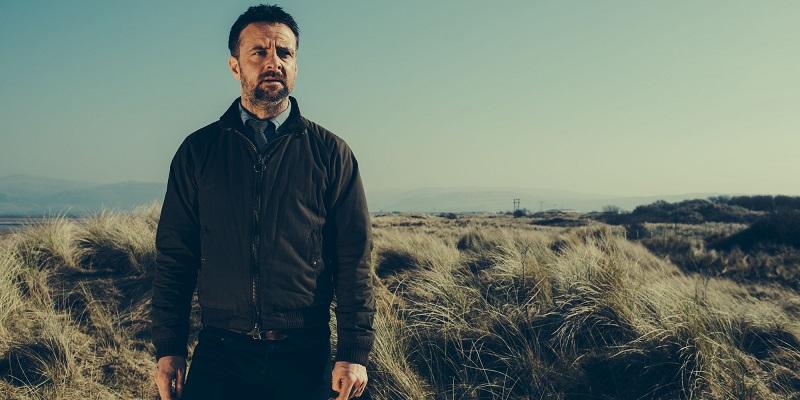Hinterland, BBC Four / Rev, Series 3 Finale, BBC Two | reviews, news & interviews
Hinterland, BBC Four / Rev, Series 3 Finale, BBC Two
Hinterland, BBC Four / Rev, Series 3 Finale, BBC Two
Welsh crime and Anglican crisis

We have all learned to genuflect at the altar of Nordic noir in recent years – see The Tunnel, the Anglo-French remake of The Bridge, and the American Killing, not to mention the news that Borgen creator Adam Price and Michael House of Cards Dobbs are to collaborate. But the traffic is not entirely one-way.
Set in and around Aberystwyth, Hinterland (****) is that rarity in British television, a genuinely bilingual production, in that it was shot twice - in Welsh and then English and Welsh. The Welsh version known as Y Gwyll was shown on S4C in the autumn. The English-language edition was first broadcast on BBC One Wales, but it now gets a national airing on BBC Four.

Richard Harrington is compelling as DCI Tom Mathias, freshly transferred from the big smoke to get away - yes - from his bungled marriage. He teams up with DI Mared Rhys (Mali Harries, pictured above), whose hints of mumsiness lurk below several layers of hard-bitten permafrost. This isn't West Wales as seen in the brochure. The place is drenched not only in rain but also blood, while the landscapes are grimly wintry, as are the faces of everyone involved in this deliciously dark show. The Welsh tourist board can take comfort that Nordic noir has done wonders for visitor numbers in Denmark.
 Rev (*****) has had a conversion on the road to Damascus. It started out as a comedy about the parlous state of the Church of England, but in the daring third series has turned into something else entirely: a moving portrayal of an individual - and by extension a national - crisis of faith. You sense that this is because Tom Hollander (leading a cast of immense dramatic heft) had long since navigated all the comic corners of put-upon inner-city vicar Adam Smallbone (pictured above left in civvies). So this time round the scripts written with fellow series creator James Wood have tackled idolatry, adultery, paedophilia and, for light relief, the spread of Islam.
Rev (*****) has had a conversion on the road to Damascus. It started out as a comedy about the parlous state of the Church of England, but in the daring third series has turned into something else entirely: a moving portrayal of an individual - and by extension a national - crisis of faith. You sense that this is because Tom Hollander (leading a cast of immense dramatic heft) had long since navigated all the comic corners of put-upon inner-city vicar Adam Smallbone (pictured above left in civvies). So this time round the scripts written with fellow series creator James Wood have tackled idolatry, adultery, paedophilia and, for light relief, the spread of Islam.
The whole series seems to have been transcribed from the Gospels. Last week on Easter Monday there was an audacious reenactment of Christ carrying the cross on the road to Calvary, at the end of which the Rev. Smallbone met God in the person of Liam Neeson in a garish shellsuit at the top of a hill. In this final episode he had a deeply unamusing nervous breakdown after the closure of the debt-ridden St Saviours. It shouldn't by rights win anything at the Comedy Awards, but this has become profoundly moving drama. Who the hell saw that coming?
Add comment
The future of Arts Journalism
You can stop theartsdesk.com closing!
We urgently need financing to survive. Our fundraising drive has thus far raised £49,000 but we need to reach £100,000 or we will be forced to close. Please contribute here: https://gofund.me/c3f6033d
And if you can forward this information to anyone who might assist, we’d be grateful.

Subscribe to theartsdesk.com
Thank you for continuing to read our work on theartsdesk.com. For unlimited access to every article in its entirety, including our archive of more than 15,000 pieces, we're asking for £5 per month or £40 per year. We feel it's a very good deal, and hope you do too.
To take a subscription now simply click here.
And if you're looking for that extra gift for a friend or family member, why not treat them to a theartsdesk.com gift subscription?
more TV
 Murder Before Evensong, Acorn TV review - death comes to the picturesque village of Champton
The Rev Richard Coles's sleuthing cleric hits the screen
Murder Before Evensong, Acorn TV review - death comes to the picturesque village of Champton
The Rev Richard Coles's sleuthing cleric hits the screen
 Black Rabbit, Netflix review - grime and punishment in New York City
Jude Law and Jason Bateman tread the thin line between love and hate
Black Rabbit, Netflix review - grime and punishment in New York City
Jude Law and Jason Bateman tread the thin line between love and hate
 The Hack, ITV review - plodding anatomy of twin UK scandals
Jack Thorne's skill can't disguise the bagginess of his double-headed material
The Hack, ITV review - plodding anatomy of twin UK scandals
Jack Thorne's skill can't disguise the bagginess of his double-headed material
 Slow Horses, Series 5, Apple TV+ review - terror, trauma and impeccable comic timing
Jackson Lamb's band of MI5 misfits continues to fascinate and amuse
Slow Horses, Series 5, Apple TV+ review - terror, trauma and impeccable comic timing
Jackson Lamb's band of MI5 misfits continues to fascinate and amuse
 Coldwater, ITV1 review - horror and black comedy in the Highlands
Superb cast lights up David Ireland's cunning thriller
Coldwater, ITV1 review - horror and black comedy in the Highlands
Superb cast lights up David Ireland's cunning thriller
 Blu-ray: The Sweeney - Series One
Influential and entertaining 1970s police drama, handsomely restored
Blu-ray: The Sweeney - Series One
Influential and entertaining 1970s police drama, handsomely restored
 I Fought the Law, ITVX review - how an 800-year-old law was challenged and changed
Sheridan Smith's raw performance dominates ITV's new docudrama about injustice
I Fought the Law, ITVX review - how an 800-year-old law was challenged and changed
Sheridan Smith's raw performance dominates ITV's new docudrama about injustice
 The Paper, Sky Max review - a spinoff of the US Office worth waiting 20 years for
Perfectly judged recycling of the original's key elements, with a star turn at its heart
The Paper, Sky Max review - a spinoff of the US Office worth waiting 20 years for
Perfectly judged recycling of the original's key elements, with a star turn at its heart
 The Guest, BBC One review - be careful what you wish for
A terrific Eve Myles stars in addictive Welsh mystery
The Guest, BBC One review - be careful what you wish for
A terrific Eve Myles stars in addictive Welsh mystery
 theartsdesk Q&A: Suranne Jones on 'Hostage', power pants and politics
The star and producer talks about taking on the role of Prime Minister, wearing high heels and living in the public eye
theartsdesk Q&A: Suranne Jones on 'Hostage', power pants and politics
The star and producer talks about taking on the role of Prime Minister, wearing high heels and living in the public eye
 King & Conqueror, BBC One review - not many kicks in 1066
Turgid medieval drama leaves viewers in the dark
King & Conqueror, BBC One review - not many kicks in 1066
Turgid medieval drama leaves viewers in the dark
 Hostage, Netflix review - entente not-too-cordiale
Suranne Jones and Julie Delpy cross swords in confused political drama
Hostage, Netflix review - entente not-too-cordiale
Suranne Jones and Julie Delpy cross swords in confused political drama

Comments
You're right, Rev turned from
You're right, Rev turned from something mildly amusing and perceptive into true tragicomedy. To watch Hollander's Smallbone react so sensitively to every encounter, and then crumple so heartbreakingly has been extraordinary: I don't know about Comedy Awards, but I'd give him a TV Actor of the Year trophy. And all the other characters are finely drawn, to the extent of one's hating them during the Agony.
Interesting too that the episode with the charismatic imam led to commentary in the papers, including one from a real east London imam pointing out that the communities should work together, and that if Xianity was losing its congregation, it was surely because of the artificial barriers put up between the clerical hierarchy and the people.
This series has been